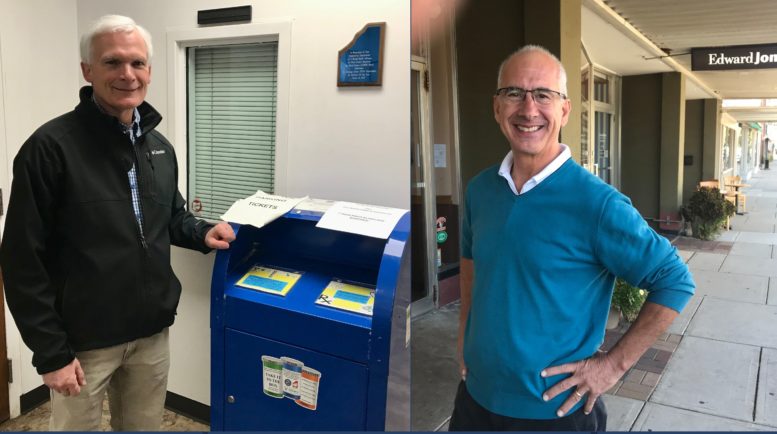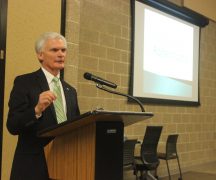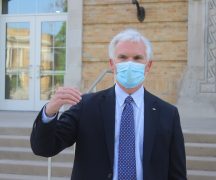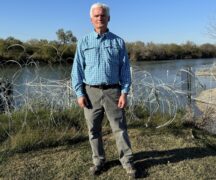By DAVID DUPONT
BG Independent News
Talking the U.S. Rep. Bob Latta (Ohio-5) and Craig Swartz, the Democrat who would unseat him is not surprisingly, a study in contrast.
That’s clear even before their respective interviews start.
Swartz takes a seat in Grounds for Thought, a coffee shop that often hosts Democratic candidates, without anyone recognizing him.
During his interview he recalls being a Boy Scout. “At the end of camp, we stood shoulder to shoulder and walked that camp and policed the area to leave it better than we found it. My passion for politics is doing exactly that: Let’s leave it better for the next generation. That’s why I’m running.”
When Latta, who has served in Congress since 2007, steps into the Bob Evans restaurant on East Wooster, he’s immediately greeted. First, it’s by a man promising his support. Then as he is seated, he’s approached by another constituent who wants to know when he’s going to do something about the factory farms polluting Lake Erie.
That’s a state issue, Latta said. But the constituent persists that Lake Erie is a federal problem as well.
Latta collects the man’s email and promises someone will get in touch with him.
When the two candidates talk in separate interviews the contrast is heightened.
Inflation is one of the most important issues vexing voters, Latta said.
A year ago, no one was talking about inflation, he said. Interest rates had bottomed out to near zero.
Now the rate of inflation is the worst it’s been in 40 years.
“It puts a hurt on so many people,” he said. “Whatever people got in last year and half in pay increases is gone. … We’ve got to get inflation under control.”
But the Federal Reserve’s approach of dramatically raising interest rates will further harm the economy. “You’ll have more people unemployed. That’s not the way you want have things to operate. You want to have people work.”
Latta recently asked a group of community bankers about their mortgage business. They said because of rising rates they had no mortgage business.
He blames profligate federal spending.
The Democrats, he said, have passed trillions of dollars in spending, including on the $1.2 trillion infrastructure package, and not paying for it.
This, Latta said, is driving inflation.
Asked what needs to be done, he said, “you draw the line, and you start now.”
He urged a return to normal order in Congress where appropriations bills are produced, instead of continuing resolutions.
The federal government should have its own balanced budget amendment, just as Ohio and almost every other state has.
Swartz wants to help people with his All-American Tax Act. “It’s called that because it benefits every single American the same way.”
The first $36,000 of someone’s income would be tax free, whether they are a retiree or billionaire.
For those at the top, he said, this is hardly a blip. But for working families this amounts to as much as $400 a month in income.
“It’s precisely what we need right now in the event we go into a recession,” he said. “You pay for this by getting rid of the tax loopholes in the 2017 tax bill. … Those loopholes are costing us billions and billions of dollars.”
Swartz also favors “staffing up the IRS” so the agency can do what it’s supposed to do: “Go after tax cheats.”
It’s estimated that the federal government loses between $500 billion and $1 trillion a year to tax fraud.
Swartz has worked within law firms that did international tax law, including spending seven years in the Middle East. The firm had lawyers making $500 an hour looking for loopholes that exist in current law.
Swartz does think how much the U.S. spends on defense, including cost-plus defense contracts which amount to blank checks for contractors, needs greater scrutiny.
US. Special Forces are stationed in 100 countries around the world, he said.
“No one wants the United States to be the world’s policeman,” he said. “So why do we spend so much on defense?”
Swartz, a former member of city council in Upper Sandusky, has operated a restaurant. That venture went under when Wyandot County’s manufacturing base crumbled.
He’s been a forklift operator, and drove freight trucks cross country, and volunteered with the Special Olympics.
As someone who worked in three different foreign countries, he has strong feelings about immigration. “What we could be doing in this country is fixing this process and getting the undocumented documented so they can get on with their lives,” he said. “People would hire these people provided they are coming in the front door.”
Latta said that more needs to be done to stop the flow of people over the southern border tying it to the nation’s drug abuse problem, especially fentanyl.
Latta sees energy as the second most important issue facing voters.
He blamed the rising cost of gas on the Biden Administration’s canceling of the permits for the Keystone XL pipeline.
Changes to the regulatory and legislative side had allowed the United States, through fracking, to become the world’s top producer in natural gas.
America’s oil production had rendered OPEC irrelevant.
Now, Latta said, Biden is going “hat-in-hand” asking the Saudis to increase production. Instead, OPEC will be cutting production.
He did not mention the impact that the war in Ukraine was having on world energy supply.
Latta criticized Biden’s release of a billion barrels of oil from the nation’s strategic reserves. “This is not an emergency when we can be doing it in the United States,” he said.
The future of energy includes a variety of sources, he said: clean coal, hydrogen, natural gas, nuclear, and alternative sources.
He’s excited about the prospect of developing small nuclear plants, small enough to fit on a flatbed truck, that could power 1,000 homes.
Latta has also long advocated for better broadband coverage, especially in unserved rural areas. The pandemic showed how important broadband was for education and the economy.
He noted that the infrastructure bill, which he opposed, provides $65 billion for broadband.
But, he noted, when he saw the FCC’s coverage maps, he realized they were inaccurate, showing broadband where it didn’t exist. If the government is going to spend $65 billion, Latta said, “make sure you’re getting it right.”
That means prioritizing areas that have no service.
Swartz believes the nation’s infrastructure needs could be financed through a national infrastructure bank. This is how Franklin Roosevelt paid for many New Deal programs. It’s how Lincoln built the railroads. It is a national version of what North Dakota has.
The bank issues treasury notes that pay premium returns to those who buy them.
With $500 billion in investments to fund it, the bank could finance loans of up to $5 trillion. “This could provide a project in every state, in every county,” Swartz said.
This could help pay for a much-needed upgrade of the electrical grid, especially as the country converts to using green sources of energy.
“We’re losing a lot of power. This is the kind of vehicle to improve the grid across the country,” he said.
Swartz also hears from people, including some Republicans, that the Supreme Court’s Dobbs ruling which overturned Roe v. Wade was “a bridge to far.”
“True conservatives believe in individual freedom,” Swartz said. Yet the Supreme Court “in one fell swoop took this freedom away from half the population of the country.”
Latta has long been an opponent of abortion. He praised the Court for sending the regulation of abortion back to the states, and he opposes the Democrats’ efforts to codify Roe v. Wade into federal law.
His campaign office, after the interview, sent out a statement noting that Latta “supports federal legislation related to abortion and believes states should decide what is best for them. He is actually a cosponsor of over 30 bills in the House related to pro life / pro family values.”




